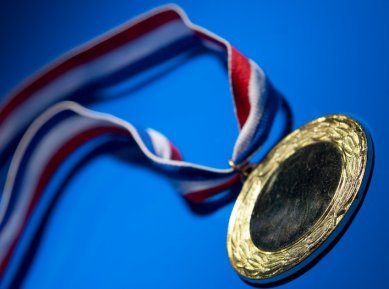The Gottfried Wilhelm Leibniz Prize is the highest honor awarded in German research. Eight outstanding researchers were chosen by the Deutsche Forschungsgemeinschaft (DFG, German Research Foundation) from 136 nominees. Of the eight prizewinners, three are from the natural sciences, three from the humanities and social sciences, and two from the life sciences. Each honoree will receive prize money of 2.5 million euros.
The following researchers will receive the 2015 funding prize in the DFG’s Gottfried Wilhelm Leibniz Programme:
- Professor Henry N. Chapman, Biological Physics/X-Ray Physics, Deutsches Elektronen-Synchrotron (DESY), Hamburg, and University of Hamburg
Chapman’s work is concerned with free electron lasers (FEL), which are used to investigate complex molecules by means of ultrashort and high-brilliance X-ray pulses.
- Professor Hendrik Dietz, Biochemistry/Biophysics, Technical University of Munich
Dietz is interested in DNA origami, which is used in the sequence-programmed synthesis of highly complex functional two-dimensional and three-dimensional nanocomponents.
- Professor Stefan Grimme, Theoretical Chemistry, University of Bonn
Grimme is interested in the development and use of theoretical models and computer programs to calculate the spatial structure of molecules, their bonding characteristics, and the distribution of electrons.
- Professor Christian Hertweck, Biological Chemistry, Leibniz Institute for Natural Product Research and Infection Biology – Hans Knöll Institute (HKI), Jena, and University of Jena
Hertweck’s work focuses on small, highly complex organic molecules produced by means of microbial biosynthesis, which represent a largely untapped wealth of potential therapeutic active substances, for example for antibiotics and cancer drugs.
- Professor Friedrich Lenger, Modern and Contemporary History, University of Giessen
Lenger studied the history of class formation in the 19th century and the social history of German artisans, and analyzed the basis of German, European, and North American urban history.
- Professor Hartmut Leppin, Ancient History, Goethe-University, Frankfurt am Main
Leppin is an expert in Late Antiquity and early Christianity. He portrays an extremely complex picture of the relationships between Christianity and political power in Late Antiquity, in particular the role of Christianity in imperial self-representation.
- Professor Steffen Martus, Modern German Literature, Humboldt-University, Berlin
Martus demonstrated how central communicative relationships were in the formation of new literary work types from the Early Modern Period into the 20th century.
- Professor Tobias Moser, Auditory Sensing/Otolaryngology, University of Göttingen
Moser has substantially contributed to a better understanding of synaptic processes in the inner ear and therefore the basis of hearing. His main interest lies in the hair cells in the inner ear.
Recent Publications by the Recipients
- Femtosecond x-ray photoelectron diffraction on gas-phase dibromobenzene molecules,
H. N. Chapman et. al.,
J. Phys. B: At. Mol. Opt. Phys. 2014, 47, 124035.
DOI: 10.1088/0953-4075/47/12/124035 - Facile and Scalable Preparation of Pure and Dense DNA Origami Solutions,
H. Dietz et. al.,
Angew. Chem. Int. Ed. 2014, 53, 12735–12740.
DOI: 10.1002/anie.201405991 - Mechanistic Study of the Titanocene(III)-Catalyzed Radical Arylation of Epoxides,
S. Grimme et. al.,
Chem. Eur. J. 2015, 21, 280–289.
DOI: 10.1002/chem.201404404 - Biosynthesis of antifungal and antibacterial polyketides byBurkholderia gladioliin coculture with Rhizopus microsporus,
C. Hertweck et al.,
Mycoses 2014, 57, 48–55.
DOI: 10.1111/myc.12246 - Cities and the Making of Modern Europe,
F. Lenger,
J. Urban Hist. 2009, 36, 99–104.
DOI: 10.1177/0096144209349891 - Universal Empire. A Comparative Approach to Imperial Culture and Representation in Eurasian History,
H. Leppin,
Hist. Z. 2014, 299, 408–409.
DOI: 10.1515/hzhz-2014-0432 - Historische Praxeologie: Quellen zur Geschichte philologischer Praxisformen,
S. Martus et. al.,
Z. f. Germ. 2013, 23, 221–225. - Uniquantal Release through a Dynamic Fusion Pore Is a Candidate Mechanism of Hair Cell Exocytosis,
T. Moser et. al.,
Neuron 2014, 83, 1389–1403.
DOI: 10.1016/j.neuron.2014.08.003




